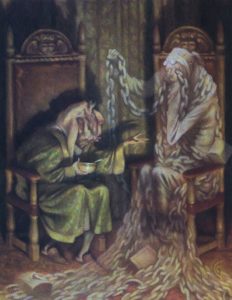Just as Scrooge Could Not See His Chains
Neither Can Most Americans See Their Chains
I love the scene in the Christmas Carol (Dickens, Charles. 1843) when Marley, Scrooge’s deceased business partner, confronts Scrooge on Christmas Eve seven years after his death encumbered with heavy chains and money boxes. Marley tells Scrooge that his chains are even more ponderous. Scrooge looks at his hands and says he sees nothing. Marley informed him that they will be invisible until the moment of his death; i.e., the accumulation of his life’s work will then be irreversible. Welcome to today’s America where the combined effect of national socialism has been invisible until the day of its revelation.
Many people in America today believe that the political battle lines are drawn between socialism and republicanism, limited government begun after the winning of the American Revolution. However, this is a misguided assumption. America’s republicanism died a slow, miserable and largely unnoticed death one hundred years ago as explained in the book, The Progressive Era (Rothbard, M. Mises Institute. 2017.). Republicanism passed from the scene with the consent of the people who looked to government to meet their needs rather than themselves.

These Two Men Dominated mid-20th Century
Both Were Loved by their People Unto Death
The book, The Dictators (Overy, R. W.W. Norton Co. 2004.), details the rise to power, the rule of power and the decline from power of these two men. From our perspective these two men were the embodiment of evil personified. The popular perception is that they ruled with an iron fist over their populations countenancing no opposition, ready to smash all opposition directly into the grave. This simplistic mindset is the stuff of video games, cheap novels, shallow Hollywood movies and ignorant talking heads both in the news-entertainment industry and in politics. The truth is more subtle and certainly more chilling.
Both men were the darling of their societies. They came to power claiming to lead their peoples to a better life through a stronger national government. The people loved them for this. The social upheavals of the early 20th century, though man-made, were blamed on unbalanced, uncontrolled laissez faire market forces: the essence of republicanism. The fact that both of these men were socialists was well known and greatly admired by the supposedly republican West. Neither of these men had such a large secret police force that they could dominate their peoples’ every action comes as a surprise to many people. In actual practice their so called secret police forces were usually inept, corrupt and viewed with suspicion by both these leaders. Yet, both of these men exhibited the fundamental error of judgment that eventually destroyed their respective governments – use of naked power to remove apparent opposition. Yet, if you were not part of the evil opposition then you probably did not have any dealings with the so called secret police. Thus, you were ignorant of the threads of dictatorial power surrounding you in your daily life.
The late 19th century saw a fundamental embracement of socialism but without the violence that was to characterize the socialism of the 20th century. How? By the application of friendly socialism which has since come to be known as Progressivism. The founding father of the strong federal government required for this to work was none other than President Abraham Lincoln who indeed resorted to violence to build the foundation of federalism that was to later morph into national socialism. The fact that he is one of the most beloved presidents is a testament to both government public educational systems and to the use of gradualism rather than naked force.
The fact that Lincoln was a Republican is usually ignored. His progressive successor was also Republican, Theodore Roosevelt (Teddy). Teddy began the international militarism that characterized American foreign policy even down to today. The party line then, as now, is that America can use violence to bring peace and democracy to countries that have neither. The fact that the use of force to elicit peace is a violation of the Law of Non-Contradiction. Violence only begets violence, not peace. Teddy also began the rise of overarching federal meddling into economics, business, and state lands under the guise of fighting against trusts. As a master propagandist Teddy pushed the image of him fighting for the average American citizen when in fact he was fighting for increasing federalism at the expense of its citizens but with their consent. Conservationism was little more than an excuse for the federal government to control vast amounts of state lands. The leasing of these lands stole revenue from the states giving it to the federal government. Far from protecting the lands, the people and businesses who leased the lands has no stake in protecting the lands leading to waste, destruction and abuse of valuable resources; the very issues that federal control was supposed to prevent.
But, the master of Progressivism was Woodrow Wilson. He used World War I as the excuse to advance socialism in America under emergency measures to fight the war. America had no threatened interests in Europe and the war was nearly spent by 1917, with an end in sight; until America entered the war. Our entry into the conflict prolonged the war, prompted an unsatisfactory ending and set the stage for World War II. Federalism at home controlled nearly every aspect of daily life, for the war effort of course, with the consent of some of the people. Those who disagreed were imprisoned much as they were under Lincoln’s administration.
Yet, it was the meddling of the Federal Reserve that caused the Great Depression and brought Franklin Roosevelt (FDR) to power. He repackaged President Hoover’s failed policies, called it the New Deal and with its implementation prolonged the Depression until after World War II. During both the Great Depression and World War II federal power controlled every aspect of American life, even rationing of food staples to control farm prices. Many of these measures were not rolled back after the war; thus, America became a de facto socialist country ever since. The war also secured America as a dominant world power which she still enjoys today though it has caused her to casually waste countless American lives to project democracy and peace through “limited” wars. These wars continue today around the world as does the internal demand for more socialism. This issue really is not about a return to republicanism but a tug of war between national and international socialism.

As long as Americans enjoy life they
Do not care to see the chains of Dictatorship
Neither political party supports a return to republicanism because the people do not support such a goal. Governments are like the people who form them, once they gain power they are loath to relinquish power; in fact, they seek to constantly expand power. This power comes from the local governments of the people and thus from the people themselves. Americans refuse to the see the chains of dictatorial power entangling them as long as they can pursue their frivolous, leisure lifestyles.
Christians should understand that there is no government that is of God. Thus, it should come as no surprise to us that all governments express the sinfulness of the people who comprise them nor of the people who support them. The reason socialism has gained such success is that it caters to the sinfulness of people. People want something for nothing and too many believe that having the government meet their needs gives them something for nothing. However, what government gives them must be taken from others to the determent of everyone. One day governments will no longer need to use gradualism. In that day governments will unleash raw power just as Mr. Stalin and Mr. Hitler did. Then, but far too late, everyone will see the chains of dictatorship binding them in every aspect of daily life. In that day the people will change from living in the image of Scrooge, invisible chains, to living in the reality of Marley, visible weighty chains, impotent to change the error of their ways.

